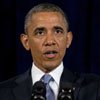The US moved closer to military intervention in Syria with President Barack Obama saying he was considering a “limited, narrow” strike without involving ground forces even as Russia dismissed claims about the use of chemical weapons by the Assad regime as “utter nonsense.”
Obama said Washington was “looking at the possibility of a limited, narrow act” and there would be no “long-term campaign.”
“We’re not considering any open ended commitment. We’re not considering any boots on the ground approach,” Obama told reporters.
He emphasised that he had “not made any decisions” about what actions the US will take. He said whatever the US does, it would not be a major operation. “We have consulted with allies. We have consulted with Congress,” Obama said, indicating an attack is imminent.
However, Russian President Vladimir Putin today challenged the US to present to the UN evidence that President Bashar al-Assad’s regime was responsible for chemical weapon attacks.
Speaking to journalists in Vladivostok, Putin said it was ridiculous to suggest the Assad regime was to blame for the August 21 attack.
“Syrian government troops are on the offensive…In these conditions, to give a trump card to those who are calling for a military intervention is utter nonsense,” he said, “So I’m convinced that is nothing more than a provocation by those who want to drag other countries into the Syrian conflict.”
Putin described the US failure to present evidence as “simply disrespectful”. He said, “If there is evidence it should be shown. If it is not shown, then there isn’t any.”
Russia, a key ally of Syria, has warned “any unilateral military action bypassing the UN Security Council” would be a “direct violation of international law.”
China and Russia have vetoed two previous draft resolutions on Syria. Media reports quoting an official said that Syria expects a military attack “at any moment” and is ready to retaliate.
Meanwhile, UN weapons inspectors, led by Ake Sellstrom, travelled to Lebanon today after visiting the site of the alleged attack in Syria and were expected to brief Secretary-General Ban Ki-moon.
Ban has said he will present the findings of the experts to the UNSC, but he wants to wait until a final report is completed. It could take as long as a week, officials said.
Emerging from a situation room meeting headed by Obama, Secretary of State John Kerry confirmed that the US would not seek approval of the UN Security Council for an attack because of the opposition from Russia to the use of military force.
“Because of the guaranteed Russian obstructionism of any action through the UN Security Council, UN cannot galvanise the world to act as it should,” he said.
US leaders indicated that they had adequate information about the use of chemical weapons and were determined to act.
“I have said before, and I meant what I said, that the world has an obligation to make sure that we maintain the norm against the use of chemical weapons,” Obama said.
Kerry laid out a raft of what Washington said was a “high confidence” intelligence assessment about the attack.
The main findings of the released unclassified summary stated that the attack by the Assad regime killed 1,429 people, including 426 children, and Syrian military chemical weapons personnel were operating in the area three days before the incident.
Communications were intercepted involving a senior Damascus official who “confirmed chemical weapons were used”, the summary said.
In response, Syria’s state-run news agency said Kerry was using “material based on old stories which were published by terrorists over a week ago.”
The US was also dealt a blow on Thursday when the UK parliament rejected a motion supporting military intervention. The vote ruled the UK out of any potential military alliance.
Obama told Cameron in a telephone conversation, he “fully respected” the approach taken by the UK government.
US officials said they would continue to push for a coalition, and France said it was ready to take action in Syria alongside the US.
French President Francois Hollande has said the British decision would not affect his government’s stance.
Obama and Hollande discussed the issue in a telephone conversation. Both leaders wanted to send Damascus a “strong message” to condemn the alleged use of chemical weapons.
Both Germany and Canada have ruled out joining any military strikes against Syria. Another US ally, Turkey, has called for action similar to the NATO bombing raids in the former Yugoslavia in 1999.
Arab foreign ministers will meet in Cairo tomorrow to discuss Syria, Arab League deputy chief Ahmed Ben Helli said.
